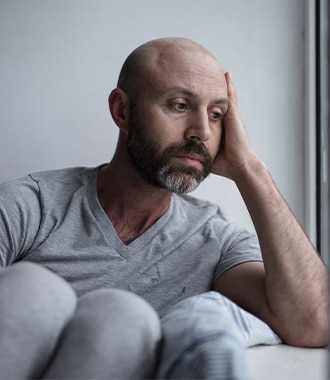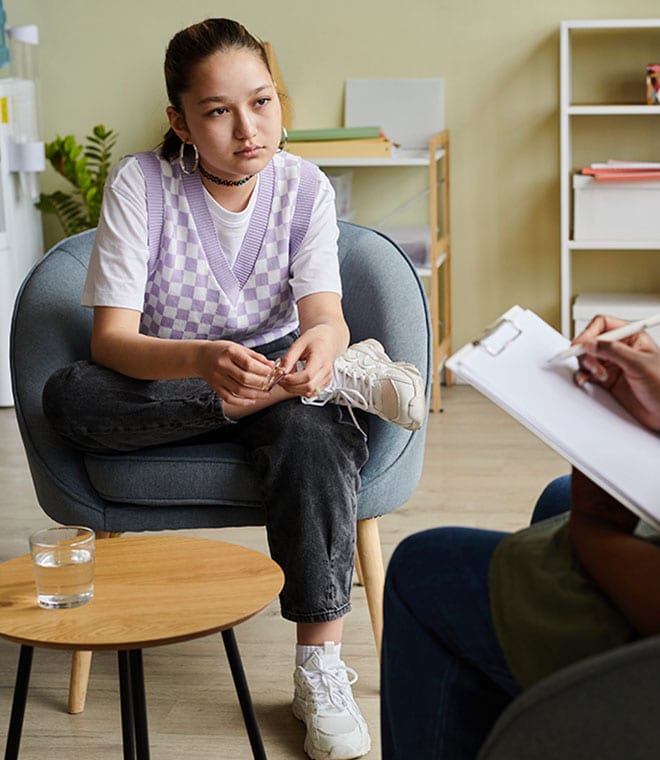Wellness
Mental health glossary: Terms you should know
By Julie McDaniel, MSN, RN, CRNI Nov 19, 2024 • 13 min
One in 5 Americans will experience a mental health issue this year. Here's a list of common terms, therapy types and providers that can help you and your family navigate mental health.
If you or someone you know is considering therapy, you can learn about different types of therapists or video chat live with a therapist for an introductory consultation today.
Mental Health Conditions
Generalized anxiety disorder (GAD). GAD is a mental health condition in which a person may experience lasting feelings of worry, fear or dread, often with anxiety-related physical symptoms, including irritability, difficulty concentrating, feeling overly tired or restless, and muscle tension.
Panic disorder. Panic disorder is characterized by sudden, unexpected bouts of panic, usually referred to as “panic attacks,” which are often paired with symptoms of a racing heart, shortness of breath, debilitating worry and intense fear.
Social anxiety disorder. People with social anxiety disorder may be triggered by situations in which other people are present. This type of anxiety is based upon the fear of being rejected, embarrassed or judged. People with social anxiety disorder may have a difficult time making or keeping friends. They may also feel nervous or ill around other people.
Depression. This is a common mental health condition that involves feelings of sadness and hopelessness that last for at least two weeks. There are several different types of depression, depending on many different factors, including the severity of symptoms, how long they last, and when they occur. Major depressive disorder (MDD), dysthymic disorder, seasonal affective disorder (SAD), bipolar depression, and postpartum depression are some examples of depressive mental health conditions.
Post-traumatic Stress Disorder (PTSD). PTSD may occur in people who have experienced or witnessed a traumatic event, series of events, or situations. Symptoms of PTSD may be experienced as emotional and physical symptoms, including sadness, anger, fear, difficulty sleeping and startling easily.
Mental Health Professionals
Certified addiction counselor. These are counselors who are specially trained to assist people with addiction prevention, treatment, recovery support and education. The level of the certification is dependent on education and experience, varying by state.
Mental health counselor or therapist. Mental health counselors (therapists) are trained healthcare professionals who evaluate a person’s mental health and use therapeutic techniques for treatment, based on specific training programs.
Creative arts therapists. These therapists and counselors are master-level professionals who guide people that are facing medical and mental health problems or seeking personal growth by using creative self-expression techniques, such as music, drama, movement and art.
Peer support specialists. Peer support specialists are volunteers who offer help to other individuals who are experiencing situations similar to their own. These positions are usually voluntary services and may not require professional certification or advanced degrees. However, completion of a training regimen, application and references may be required. Requirements vary by state.
Licensed clinical social worker. These specialized social workers can diagnose mental illness, and they typically handle more sensitive cases with varying levels of support, medical assistance and long-term treatment plans. A licensed clinical social worker cannot prescribe medications. They must have a master's degree in social work and maintain proper clinical licenses.
Licensed social workers. Licensed social workers can provide or facilitate therapy, but they cannot prescribe medication. They typically have fewer education requirements, such as a bachelor's or a master's degree in social work, when compared to licensed clinical social workers.
Marital and family therapist. Marital and family therapists have a master's degree and specialized training with couples and families in individual and group settings. Marriage and family therapists treat many different serious clinical problems, including marital problems, anxiety, depression, individual psychological problems and child-parent problems.
Pastoral counselor. Many people choose to seek mental health therapy from clergy who are trained to provide clinical pastoral therapy. These professionals can diagnose mental health issues without prescribing medication. They incorporate spiritual guidance into therapy.
Psychiatric mental health nurse. Psychiatric mental health nurses are specially trained nurses who can only administer therapy under the direction of a physician or nurse practitioner. They can administer medications, but they cannot prescribe them.
Psychiatric nurse practitioner. Psychiatric nurse practitioners are advanced practice nurses who may diagnose, treat and prevent mental health disorders. Psychiatric nurse practitioners can prescribe medication and administer psychological therapy.
Psychiatric physician assistant. Physician assistants (PAs) practice medicine with physician supervision, similar to nurse practitioners. PAs can perform psychiatric evaluations and assessments, order and interpret diagnostic studies, establish and manage treatment plans, and refer as needed.
Psychiatric social workers. Psychiatric social workers have a master's degree or a PhD. They can diagnose mental illness and perform psychological therapy. They can provide or facilitate therapy, but they cannot prescribe medication. Some social workers pursue additional voluntary certification, such as a qualified clinical social worker, to demonstrate their mental health expertise.
Psychiatrist. A psychiatrist is a physician (MD or DO) who has completed medical school and residency and focuses specifically on the diagnosis, treatment and prevention of mental, emotional and behavioral disorders. Psychiatrists can assess both the mental and physical aspects of psychological problems, conduct psychological therapy, prescribe medications, and order medical tests and treatments.
Psychologist. A psychologist has an advanced degree, usually a PhD or PsyD in clinical psychology, and has completed an internship with exposure to methods of treatment, analytical testing, problem-solving techniques and behavioral therapy. Psychologists treat mental health problems with psychological therapy and other behavioral interventions; however, they generally cannot prescribe medications.
School psychologist. School psychologists are certified psychologists who practice in a school setting and are often involved with assessment and diagnosis, intervention, prevention, health promotion and program development for students.
Therapy and Interventions
988 Suicide & Crisis Lifeline. The 988 Suicide & Crisis Lifeline is a national network of local crisis centers that provides free and confidential support, prevention and crisis resources for people in suicidal crisis or emotional distress, 24 hours a day, 7 days a week. You can text or call 988, or visit Lifeline (988lifeline.org) to chat for help for yourself or a loved one.
Cognitive behavioral therapy (CBT). CBT is a type of psychological treatment that focuses on helping a person recognize and change unhealthy or negative thinking patterns by learning ways to implement positive behaviors, redirect thoughts and develop better coping skills.
Experiential therapy. In experiential therapy, many different types of therapy and therapeutic interventions beyond traditional talking therapy are used to help a person become more aware of their internal perceptions surrounding events in life. Role-play, guided imagery or other therapeutic activities may help a person gain awareness and understanding of their emotions and thoughts related to life events.
Group therapy. Group therapy allows individuals to work through problems by sharing with others who have similar experiences, challenges or goals. Types of groups include general, specialized and support groups. Group members usually receive less individualized attention than those going through individual therapy.
Interpersonal therapy. During interpersonal therapy, the therapist reviews the person's relationship and emotional reaction patterns. The focus for treatment emerges from current relationship issues, such as a loved one's death, a struggle with a significant other or some other important life event.
Online therapy or virtual/telephonic therapy. Online therapy, also known as “telehealth,” uses technology to allow a provider to offer services to a patient virtually, including via telephone, live video and online chat. This setting has recently been more commonly used, especially during the COVID-19 pandemic. Providers who deliver care online are held to the same standards of care, licensure and privacy expectations as those providing care in-person.
Psychoanalysis. Psychoanalysis is a specialty in psychology that aims to change or modify an individual's personality by addressing a variety of relational and emotional issues. Psychoanalysis promotes healthy functioning, healing and creative expression through awareness of unconscious habitual patterns of emotion and behavior.
Psychodynamic therapy. Psychodynamic therapy is used to help a person identify and sort through current thoughts and feelings connected to past experiences. This therapy focuses on self-reflection, self-examination and the use of the relationship between therapist and patient to evaluate problematic relationship patterns in the patient's life.
Eye Movement Desensitization and Reprocessing (EMDR). EMDR is an individual therapy which is often used to help a person process emotions, thoughts, and physical reactions surrounding traumatic events they’ve experienced. This approach is often used to help people with PTSD, including in veterans.
Medications
Selective serotonin reuptake inhibitors (SSRIs). SSRIs are a common starting point for people starting an antidepressant for the first time. This class of antidepressant medication increases the amount of active serotonin neurotransmitter in the brain. This type of antidepressant typically has fewer side effects and is generally considered a safer option than others.
Serotonin and norepinephrine reuptake inhibitors (SNRIs). SNRIs are commonly prescribed antidepressants because interactions with other medications occur less frequently while taking them. This class of antidepressant medication increases the amount of active serotonin and norepinephrine neurotransmitters in the brain. People who take them may experience some side effects, such as nausea, dizziness and sweating.
Monoamine oxidase inhibitors (MAOIs). MAOIs are a class of antidepressants that are generally not a first-choice treatment due to a higher chance of serious side effects and strict safety guidelines. Special care must be taken when prescribed this type of antidepressant because certain foods, drinks and medications could be very dangerous or fatal while taking an MAOI.
Norepinephrine and dopamine reuptake inhibitors (NDRIs). This is a class of antidepressant medication that increases the amount of active norepinephrine and dopamine neurotransmitters in the brain. These medications may be used to treat depression, seasonal affective disorder, and nicotine addiction/smoking cessation. Other off-label uses may include bipolar depression or attention-deficit hyperactivity disorder.
Benzodiazepines. This commonly used anti-anxiety medication typically works quickly and is intended for short-term use to help with anxiety attacks.
Tranquilizers. This type of medication is also known as anti-anxiety drugs or antipsychotics, depending on if it’s a minor or major tranquilizer. These medications relieve anxiety symptoms by slowing down the central nervous system and producing a calming or sedating effect. Some tranquilizers are commonly prescribed as sleeping pills and muscle relaxants.
Tricyclic antidepressants (TCAs). TCAs require more time to take effect compared to SSRIs and SNRIs. Because they are generally accompanied by more side effects, they are usually only prescribed when an SSRI is not successful.
Updated by Julie McDaniel, MSN, RN, CRNI, November 2024.
Sources:
- https://www.nimh.nih.gov/health/statistics/mental-illness
- https://www.ncbi.nlm.nih.gov/books/NBK470159/
- https://my.clevelandclinic.org/health/treatments/25165-substance-abuse-counselor
- https://www.apa.org/ptsd-guideline/patients-and-families/cognitive-behavioral#
- https://nami.org/About-Mental-Illness/Treatments/Types-of-Mental-Health-Professionals
- https://arttherapy.org/about-art-therapy/
- https://988lifeline.org/
- https://www.mhanational.org/how-become-peer-support-specialist
- https://americanaddictioncenters.org/therapy-treatment/experiential
- https://medlineplus.gov/anxiety.html
- https://americanaddictioncenters.org/therapy-treatment/group-individual
- https://www.aamft.org/About_AAMFT/About_Marriage_and_Family_Therapists.aspx
- https://www.ncbi.nlm.nih.gov/books/NBK539848/
- https://americanaddictioncenters.org/antidepressants-guide/ndris
- https://adaa.org/find-help/treatment-help/types-of-therapy
- https://www.aapa.org/news-central/2017/04/pas-perfect-bridge-vetween-medical-mental-health/
- https://www.nimh.nih.gov/health/topics/technology-and-the-future-of-mental-health-treatment
- https://nami.org/About-Mental-Illness/Treatments/Psychotherapy
- https://www.nimh.nih.gov/health/topics/anxiety-disorders
- https://www.apa.org/ed/graduate/specialize/school
- https://familydoctor.org/types-of-antidepressants/
- https://www.fda.gov/drugs/investigational-new-drug-ind-application/general-drug-categories
- https://www.apa.org/ed/graduate/specialize/psychoanalytic
- https://www.ncbi.nlm.nih.gov/books/NBK562309/#_nbk562309_pubdet
- https://www.womenshealth.gov/mental-health/mental-health-conditions/depression
- https://www.ptsd.va.gov/understand_tx/emdr.asp
- https://medlineplus.gov/posttraumaticstressdisorder.html
- https://www.ptsd.va.gov/understand/what/ptsd_basics.asp



